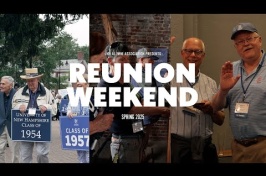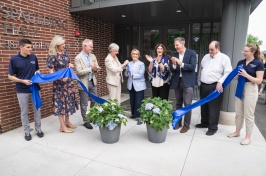
UNIVERSITY OF NEW HAMPSHIRE
2016-17 FACULTY SENATE XXI
|
The fundamental function of the approved minutes of the Faculty Senate is to accurately document actions taken by that body. Additionally, the minutes traditionally seek to provide context by capturing some statements of Senators, faculty in attendance, and guests. The minutes do not verify the veracity, authenticity, and/or accuracy of those statements.
|
Meeting called to order at 3:40 p.m. on September 26, 2016 MINUTES SUMMARY
I. Roll – The following senators were absent: Berlinsky, R. Collins, Finkelhor, and Krzanowski. Barnett and Kinghorn were excused. Tracy Birmingham, Ted Kirkpatrick, Jaime Nolan, and Nancy Targett were guests.
II. Remarks by and questions to the Provost – Provost Targett said she had several updates for the Senate. First, she said that the Budget Advisory Committee, co-chaired by herself and Chris Clement, VP for finance and administration, will have its first meeting in mid-October. President Huddleston will be there to charge the committee. She said that the plan is for the committee to meet once per semester, but that she is sure that the committee will need to meet more frequently in the early stages. A “Budget 101” will be prepared and shared so that everyone starts with the same understanding.
Nancy then announced that the University System of New Hampshire has indicated that it will pay for all system schools to use the Student Success Collaborative software, demonstrated by Erik Candy at the last Senate meeting, for one year. She said that we are not mandated to use the software, but that this seems like a good opportunity to pilot the program. She has asked the senior vice provost for academic affairs to work with the appropriate Faculty Senate committee to determine a set of metrics for success which we can use to determine the success of the program, and if it is something we want to continue using after the pilot period.
Next, the provost shared that she has spoken with the Senate Agenda Committee to gain insight regarding why there seems to be a sense that shared governance is not working as it should and that there is insufficient sharing of information. She said that this is not just an issue at UNH, but that other institutions are dealing with this. She asked if the disconnect might be the result of a mismatch between the necessary speed of administrative decisions and the time it takes to deliberate in the manner of the Senate. She suggested that there might be things that can be done to fast-track certain issues which are driven by state and federal regulations in an effort to ease the dissonance and to allow more time for topics that truly deserve full deliberation.
As an observation, the provost noted that the Senate has embraced CCLEAR faculty this year in its membership. She said that she has noticed inconsistencies across the university community regarding how CCLEAR faculty are allowed input into faculty governance. She asked if the Senate has a position on the policies and practices related to faculty input in their departments. She suggested that the Senate consider proactively discussing these inconsistencies, and acknowledged that such discussions are not in her purview.
Regarding the controversy over the Morin gift and the monies used to purchase the scoreboard, the provost said that she spoke with the president and others about this issue. She said that how this issue is viewed across the community is largely shaped by the seat from which it is viewed. She said that most students have a holistic view, in which they see how academic and co-curricular activities and resources work together to shape their educational experience. She said that the scoreboard is part of that overall experience.
She said that when she arrived at UNH, she began a deep dive into the budget to catch up on the campus environment and was startled to see a large deficit in the central administration’s budget. Upon investigation, she learned that when the state drastically cut funding for higher education in 2012, the central administration took on a $11.3 million deficit in order to preserve funding to the academic units. The plan was to manage this deficit centrally and then eventually retired centrally so as not to pass that deficit on to the units. From her perspective, she asserted that this university does indeed value academics, and that the administration cares deeply about the academic mission of the university, its student, and faculty. She said that enrollment challenges are not trivial, and assured the group that academics are front and center in the administration’s priorities. She offered to return on another day to bring data to back up her confidence in that statement.
She also said that she attended the first home football game and saw the pride and enjoyment of the students, alumni, and visitors who attended the event. She promised to make sure that academics are represented when decisions like this are made going forward. A senator said that her assurances are good to hear, and that he would like for the faculty to have a voice in those kinds of decisions. Nancy said that she believes that when faculty are kept in the loop, it goes a long way towards helping them feel a part of the process, and called her operation a very transparent one.
Another senator said that examples of failed shared governance include the elimination of the faculty club in the Oak Room, as well as the fact that the president spoke to the Senate (on August 29th) just days before announcing the Morin gift and its use to pay for the scoreboard, without even bothering to tell the Senate about that decision. She asserted that he certainly knew about the planned use of the gift, and that not talking to the Senate about it is evidence of failed shared governance.
Nancy said that things like buildings for classrooms and faculty. The football stadium has not been updated since 1932, and that this renovation was a modest, although well executed, project which fits UNH and our student athletes.
The senator responded that the mandatory reporting issue related to Title IX is another example of the administration sending mandates to the faculty without consultation with them, and that the faculty does not appreciate this behavior. Nancy said that there may be some disagreement as to the interpretation of these issues, but that she agrees that faculty should be made aware of such issues. She said she has had conversations with the Senate Agenda Committee about how to increase this kind of communication. She said that she does believe that there should have been more information and follow-up to the president’s letter that included the announcement of Title IX and mandatory reporting. She said that we can do better than that.
Another senator said that it seems to him that UNH says it is committed to providing a high-quality education, and yet there is a trend to reduce the number of tenure-track positions, to increase class sizes, and to hire instructors who are not fully qualified. He said that the number of non-tenure-track faculty has dramatically increased, and called it an inappropriate trend. The provost responded that what UNH is facing is what public flagship institutions are facing across the country. With state funding declining, the university is seeking to diversify its portfolio to ensure that it can deliver a high quality education for UNH students. Nationally, there is also ongoing discussion about what constitutes a high quality education. Certainly in today’s world it includes opportunities for experiential learning, among other things. She said that the academic baseline is shifting, and educators are trying to determine the new norm, and to find the best way to most effectively fulfill our mission. She said that there are many different opinions and that UNH is navigating this changing environment like everyone else in higher education, and she would welcome that conversation with the Senate.
The chair thanked the provost for her time.
III. Remarks by and questions to the Senate Chair - Chair Dante Scala announced that all of the Senate standing committees should have met by now. He asked any senators who have not yet been contacted by their committee chair to please let him or the Senate admin know so that we can help connect them with their assigned committees.
As a point of information, Dante said that the Agenda Committee was approached by the dean of the Library with an offer of space for the Faculty Senate office. The space would be on the third floor in the suite of offices currently occupied by UNH ADVANCE. The Senate office currently is located in the basement of Thompson Hall. The Agenda Committee discussed the offer and voted unanimously to not move the office based on two points: 1) the proffered space in the Library is currently available only for the next three years, after which it is unclear what the options will be and, 2) the committee feels that there is a symbolic importance to staying put. For the sake of transparency, he wanted to make the Senate aware of that decision.
Dante then informed the group that the Senate admin has included several documents on shared governance in today’s agenda. These documents are for the information of the senators regarding the history of the discussion on shared governance, and can be used as guidelines, but the chair said that in his opinion shared governance is in the facts on the ground and what we do as a campus community.
IV. Minutes – It was moved and seconded to the minutes from the September 12, 2016 meeting. A senator noted that she was incorrectly marked as “excused” when she was in fact in attendance at the meeting. A correction was offered in Item II. A senator asked if the statement attributed to the associate provost for finance and administration about revenue retention rates not being part of the RCM review (Item IV) reflected what was said in the meeting. The Senate admin said that it did. The minutes, as adjusted, were approved unanimously with 3 abstentions.
V. Conversation with Jaime Nolan regarding Title IX and mandatory reporting – Dante introduced Jaime Nolan, the associate vice president for community, equity, and diversity, Tracy Birmingham, university counsel, and Ted Kirkpatrick, dean of students. They were invited to speak to the senate about UNH’s policy on Title IX, particularly in regards to mandatory reporting of sexual violence, harassment, and hazing. Jaime said that she wants today’s discussion to be an open conversation, and that they don’t want to present information the senators already know. She said that all faculty should have received a memo and quick guide regarding mandatory reporting in their emails today, saying that her email arrived just before she left to come to this meeting. No senators indicated that they had received anything yet.
Jaime said that there has been no change to UNH’s policy, but that the current guidelines are part of an ongoing outreach to faculty to educate and support them. This policy is not about simply meeting legal requirements, but rather to help provide a safe and equitable environment for all students at UNH. She said that both federal and state regulations are involved in this policy.
She reminded the group that she came to the Senate last year to discuss Title IX and mandatory reporting, and noted that there is now a Policy Committee and an Education and Outreach Committee for this subject. Both of these committees have faculty members who will report to the Faculty Senate. At this time, she is looking for someone to fill a faculty seat on the Steering Committee.
A senator noted that the local AAUP (tenure-track) chapter has stated that they feel that this policy is a contract issue. Jaime said that she cannot speak for the AAUP, but that she has reached out to that group to have a conversation about the policy, and that she hopes it will be fruitful.
Another senator said that the policy defines clergy (who are exempt from the mandatory reporter status) as ordained clergy. He pointed out that in many churches there are lay ministers who serve the same function without being ordained, and said that as it is currently worded, the policy discriminates against Islamic Imams, and a variety of other religious leaders who would not qualify for exemption under the current wording of the policy. He suggested that this amounts to discriminating against victims of sexual assault or harassment, or hazing based on their religion.
Ted Kirkpatrick, dean of students, said that this is a great question, and noted that the exception to the mandatory reporter policy is for people who are clergy and who should expect to have a confidential relationship with students, faculty, or staff. He said he would like to see the case law on this. Tracy Birmingham, university counsel, said that the objective is to make sure that students are served in the best way possible, and that their expectations are met. She said that such information about lay clergy would be helpful for counsel to know, and that these would be taken on a case by case basis. A senator from the School of Law suggested that an analogy that might be useful in changing the policy’s language is the Law of Evidence recommendations, in which there is a priest-penitent privilege that is much more expansive than the current language in the policy. He said that this would include Imams and lay ministers, and might be the place to look for a more expansive definition of clergy. Tracy thanked him for the suggestion.
A senator said that her students assume that what they tell her is confidential, and that she doesn’t know what she would put on her syllabus to indicate that certain topics can be confidential and others (such as sexual harassment, etc.) cannot. She also said that it seems that mandatory reporting cannot be the legal obligation of faculty, because it cannot be imposed on faculty.
Ted responded that the institution has a compliance requirement, and suggested that mandatory reporting has become commonplace in the school systems, so much so that most students in fact expect that their teachers are mandatory reporters for sexual assault, hazing, and sexual violence. The senator said that she doesn’t want to say or do anything that creates any ambiguity regarding whether a student can confide in her or not, and if she doesn’t already have a legal obligation to report something, that she doesn’t want to take that on. Ted said that it’s not a matter of taking on an obligation; that obligation already exists for all of us who are employees of the university. We would be wise to make that clear to our students, because the university will indemnify us if we do. If we violate the policy, there will be problems. The senator asserted that mandatory reporters for Title IX already exist at the university, and asked why this is now being extended to faculty. Ted said that lawmakers felt that there ought to be people in the wider society, professional, who should by rights, in order to reduce sexual violence, be required to report incidents when they are aware of them. With better reporting comes a decline in victimization rates. The greater good being sought by this policy is to have better reporting and social control in order to comply with state and federal requirements.
Another senator said that we need to fight sexual violence, and asked what the university’s responsibility is to report a risk to students, such as date-rape drugs being used in the community. She said that students need to be made aware of risks. Ted asserted that the primary date-rape drug in this community is alcohol. He said that we need to be clear with our students about role boundaries and what is expected when they enter a sexual relationship. In the past months he has spoken with many at-risk student groups on this topic. He said there are legal challenges to the way that we adjudicate these cases, and he said that UNH is committed to handling these cases correctly according to the law. He said that if faculty want to know what to say to students, they need to talk to their students about sex, alcohol, and consent. He said that they, particularly the young men, need to hear from us what is acceptable relative to consent. He said that that is the most comprehensive strategy he can share.
Tracy said this is why it is important for reporting to come from everyone. Those who are making determinations in these cases will have better information if they have information from many sources, and early on. She said there’s no way to spot trends without information.
Another senator asked if racial and ethnic violence and harassment should also be reported, and if not, why not? She asked about the sensitivities of our students and expressed concern that some faculty might be open to accusation of harassment based on the content of their courses. Ted responded that the administration is about free inquiry. He said that if faculty place on their syllabi information about potentially sensitive topics to be discussed in a course, then students can decide if that course is appropriate for them. He said that it may be that the university is left open to a challenge on a particular subject, but that can be dealt with. As far as racial and ethnic violence, there is a “Report It” button on the UNH website for this purpose.
Ted said that Title IX began with sports equality, as an effort to provide equal opportunities for women in athletics in the schools, but now it has become evident that sexual assault/violence have become obstacles to equal opportunities for education. He said that there are other titles under the Civil Rights Act that we’re also trying to address.
Another senator said that we’re asking too much of professors, who are not sufficiently trained. She said that there are experts on campus, and we need to direct students to those experts. She also said that she is not comfortable tossing students into the legal system. Jaime said that that’s why this system is being set up, under which there are confidential reporters to whom we can refer students. Donna Marie Sorrentino is the point person for this, and her number is on the reference cards that are being distributed on campus. She reports to Ted. She and Ted decide whether to go after someone who has been accused of assault, violence, or hazing. They also are there concurrently to support the student in a concurrent process. Jaime said that their office does not want to risk the agency of the students.
A senator from the School of Law said that mandatory reporting does not require faculty to call the police. Tracy said that this may not be the case. When making a report, faculty do not know what the next step will be. The students involved are given choices. This is our process, and our consequences.
A senator said that many questions were raised in her departmental faculty meeting. She asked what the legal obligations are under state law and under the UNH policy, asking if the UNH policy is based on that law. One of the documents calls for dual notification of both UNH officials and the campus police. Tracy said that while other universities may take a different approach, under strong advice of counsel, UNH is following the state guidelines. The New Hampshire Supreme Court determined that we owe this to our students. She said that the legal mandate is more extensive in New Hampshire.
She said that the object to the UNH policy is to make it easy for faculty and staff; just pick up a phone and call. A senator told of an experience he had with a staff member asking to speak with him in confidence regarding sexual violence in the family regarding a minor. He stopped the conversation and called SHARRP to refer the person to them. He asked if that was the right approach.
Ted said that SHARRP offers direct service to students, and is not a reporting agency, but rather has legal obligations that prevent hem from reporting, as a confidential support provider. If a faculty member has a question, they may call him or email him personally at ted.kirkpatrick@unh.edu . He said he will have answers, or he will consult with someone and respond with that answer.
A senator said that faculty may be uncomfortable reporting to police, and asked if it were appropriate to report to Donna Marie and allow her to report to the police. Jaime said that Donna Marie will report to the police regardless, but that she is not available 24/7, meaning that a message on her voice mail or an email may not be seen overnight or over the weekend. In this case, it is important to also report to the police, who can take some action right away. Ted said that the university wants to provide as much coverage as possible. The police are well equipped to determine whether or not a crime has been committed. He said that the Title IX coordinator’s office has nothing to do with prosecution, but rather they decide if there are enough facts to proceed with a complaint against the individual. An independent investigator is appointed to review all the facts. Victims may choose to not press charges. The coordinator’s office’s objective is to help the victims regain control over the situation.
A senator asked what happens if faculty do not report an incident. Tracy said that there could be future repercussions, should a student later change their mind and sue the university or contact the Office of Civil Rights, or if another victim comes forward and it comes to light that previous incidents were not reported. Several senators asked what the legal penalty is for non-reporting faculty. Tracy replied that there is responsibility under expectation of employment with the university, and then there is criminal responsibility. and Tracy responded that not reporting sexual harassment during a hazing incident is a misdemeanor. Failing to report sexual abuse involving a minor is also a misdemeanor,
The chair said that if there were more questions, faculty could email him at dante.scala@unh.edu, and he will pass the message along, or email Jaime directly at jaime.nolan@unh.edu. He thanked Jaime, Tracy, and Ted for their time today.
VI. Discussion of materials presented on Student Success Collaborative software – The chair announced that the provost has informed him that the University System of New Hampshire has agreed to pay for a year’s pilot for all system schools of the Student Success Collaborative software that was demonstrated a the last Senate meeting. Dante turned the time over to the Information Technology Committee’s co-chairs for further information.
John Gibson and Wheeler Ruml have reviewed the available materials shared with the Senate committee chairs and said that the Student Success Collaborative software has the potential to have a positive impact, but that this program represents a big change in the way we advise students at UNH. John said that it is impossible to judge its feasibility for UNH from the brief demonstration we observed. The ITC recommends a full assessment prior to rolling the program out full-scale. John noted that the financial cost is a separate issue from the costs to faculty in learning a new system and that ongoing burden. The ITC and Academic Affairs Committee would like to jointly review the success of the pilot program.
John said that UNH Academic Technology did a thorough assessment of Canvas before it was implemented, and that is what he thinks should happen with the Student Success Collaborative software so that it can be thoroughly vetted.
A senator said that any time a faculty member would request the kind of information being gathered and used with this software, regarding our students, that request would be subject to the Institutional Review Board for the Protection of Human Subjects in Research (IRB), since every single request of the software essentially will be a research query, requiring IRB approval. Another member said that his understanding of IRB is that if the information gathered is not being used for research to be published, but rather is being used internally, it does not require the same IRB approval.
The chair said that he would prefer that these kinds of issues be worked out by the Senate committees who will be charged to review the software and its pilot use. He said that he has received many questions from faculty about the software, both enthusiastic and skeptical. He said that the Agenda Committee will develop a charge for the review of this software by the ITC in collaboration with the AAC. Another senator asked if the senators would be able to see the comments from other faculty about the software, and Dante said that he could make those available.
VII. New Business – The chair shared two motions that were sent to him regarding the Robert Morin donation to the university, and the administration’s decisions about how to spend those funds. He told the group that the remaining portion of this meeting would be divided in order to have equal time to address each motion.
The first motion came from the members of the Senate Library Committee.
Motion presenters: Patricia Emison, chair of the Senate Library Committee
Rationale: Robert Morin, UNH '63, lifelong librarian, left $4,000,000 to the University when he died in 2015, with $100,000 designated for the Library. When the University announced the gift on August 30, 2016, President Huddleston designated $2.5 million to "launch an expanded and centrally located career center for our students and alumni," and $1 million to "support a video scoreboard for the new football stadium." The scoreboard had been installed in June 2016 with no mention of any donor.
The motion is intended to assert the primacy of the core academic mission of the University as a more appropriate beneficiary of the donor's generosity. Neither Provost nor Library Dean had a chance to make arguments on behalf of the academic mission, let alone any faculty.
Particularly since he worked at the Library for approximately fifty years, and was known as an avid reader, the Library Committee wishes to express support for the gift going entirely to the Library. It is relevant to this consideration that the Library does not factor in the current Capital Campaign because it had no capable administrator in place when the planning was done, and furthermore relevant that the Library has no adequate resources for dealing with the inflation in the costs of library acquisitions. This ongoing issue has grievously impacted on acquisitions over a number of years. An endowment that used the Morin Gift as its kernel might make it feasible to begin to deal with this issue and might attract further donations, whereas the outcry by alumni and students on social media in particular, and the unfavorable publicity in a number of national news sources, can only dampen future giving, not only to the Library but to the University in general. There is furthermore an urgent need to protect Library collections in storage, which are currently lacking effective climate control. This gift might providentially solve this problem and avert a costly remediation program that could become necessary if the climate control is not attended to.
Motion: We deplore the allocation of the generous donation by Robert Morin, '63, to non-academic purposes. We furthermore deplore the absence of consultation with Faculty and Deans. We cannot understand how this serves the best interests of the students.
Library Committee chair Patricia Emison said that her committee also sent a letter to the provost, the chancellor, the vice president for advancement, and the university president expressing their alarm at learning that $1million of Morin’s gift was spent on the football scoreboard. Their letter was shared with all of the senate members.
Dear President Huddleston:
The members of the Senate Library Committee would like to express their deep concern over both the process and the outcome of the decisions regarding Robert Morin's legacy. We are ourselves discomforted by the prioritizing of ancillary functions of the University rather than the core academic mission, and we are additionally disturbed by the negative publicity generated for the University. Despite the argument we have often heard that financial support for athletics ultimately is beneficial to the finances of the University, the reverse seems to be evident in this case: many alumni and students have expressed in social media their distaste for so flagrant an extravagance in response to the unexpected gift of a man whose life was dedicated to books and to the library; parents of prospective students have vowed never to send their children to a school that spends so freely on what is superfluous while charging high tuition and fees. The Governor herself has deemed the decision "concerning and perplexing."
The Senate Library Committee would like to point out that some sort of scoreboard and an improved career services facility are commitments the University would have fulfilled even if Robert Morin had not left this windfall to the University. The fact that he gave a designated portion of $100,000 to the library is a clear indication that he cared about the place he spent his working life, and given that the Library currently has extremely acute needs, we would urge that more of the legacy---ideally all of the legacy---be assigned to the Library. Currently the off-site storage facility for the Library is distressingly below standard and the collection at risk from mold; Mr. Morin's gift would enable us to solve this pressing problem and ensure the long-term safety of these collections held for the benefit of all citizens of the state. No money is currently available for this important task, which ought not to be put off. In addition, since the Capital Campaign was defined before the present Dean was in place to promote the Library, and does not include the Library as one of the key initiatives, it would seem highly fitting to use Robert Morin's gift to aid collections acquisition for the Library, perhaps to be the foundation of an endowment whose income would be designated specifically for acquisitions. We would hope that many people might follow Robert Morin's example and give to the University in honor of the Library's collection; very few, social media would indicate, are inspired by the decisions as they presently stand.
The recent press attention (e.g., NPR's headline "$1 Million of Frugal Librarian's Bequest to N.H. School goes to Football Scoreboard") highlights the sensitivity of the public and the media to what is perceived as lavish expenditure. Not only do we disagree with the priorities the announced disbursement of the gift implies, but we fear real damage has been done to future fundraising potential, since the allocation of this gift seems so clearly to have been determined by the bills coming in at the moment, rather than by any long-range sense of academic aspiration or real respect for the library-centered life of the donor.
We hope that you will reconsider the distribution of this gift, and thereby reassure the public as well as the faculty that the academic mission of the University is held to be of foremost importance.
Yours truly,
The Senate Library Committee
Patricia Emison, Chair
Patricia asserted that the president erred in making this decision, and that the Senate can help him step back and re-apportion the money. She said that UNH is the laughing stock of the media, with articles on this issue in the Washington Post, USA today, the Portland Herald, the Concord Monitor, and on and on. She stated that this exposure is not good for future donations to the university, or future legislation from Concord, and asserted that this decision will come back to haunt us, particularly in light of the donor being a former library faculty member. She said that we need to vote loudly and clearly, and vote now, before the new capital development campaign is designed.
Another senator said he and his partner did an analysis of social media on this story, and found that there were 29,000 pieces written on this story between September 15 and September 17, reaching a minimum of four million people. Another friend of his did an analysis on Reddit (with seven million subscribers and thirty million lurkers) on this story and found that this was the top content this year, and the fifth top content of all time. He asked who the tone-deaf one it was in public affairs who didn’t anticipate this negative reaction, and stated that he has no confidence in the decision making of the administration.
Another senator said that he does not agree with the president’s decision, and that nothing we can do here will retract the press we have received, or change what has been done. He suggested that it is the president’s prerogative to balance methods of attracting students. He said that the Senate’s expression that we deplore his choice may draw more headlines, but asked if it will change anything. He suggested that there are other ways to spend our time in this meeting.
Another senator suggested that this is another example of extravagant spending, and that while the motion’s language is a bit strong, the kind of information shared by the provost regarding how money is spent might be helpful for the population at large, rather than a refusal to reconsider the decision already made.
A senator suggested that a strong statement from the Senate shifts the focus to emphasize what the faculty believe. He said he is not sure that the president has gotten the message. He said that the language of this motion might need some adjusting, but that he is in favor of a strong public statement, with everyone supporting it. Another senator said that she supports this motion, perhaps with some change to the language. She said that when the president goes before the legislature, she does not want their understanding of what UNH represents to be solely based on the president’s actions or what they have seen on social media. She suggested that a strong motion from the Senate may reflect better on UNH in Concord.
Another senator said while he applauds the strength of the proposed motion, he believes that it would be unwise to vote on it today. He suggested one way to exercise shared governance rather than autocratic governance is to give the president a chance to speak to the Senate to respond to faculty concerns and share the process.
A senator mentioned that a justification has been offered for the use of Morin’s money to pay for the scoreboard; that in his last months he watched a lot of football in the care facility where he stayed. She said that regardless of the motivation, this kind of justification looks bad.
A senator said that it would be better to word the motion to call the president’s failure to share the information with the Senate a failure of shared governance rather than to simply condemn his actions. Another senator said that there are two separate issues; whether it was wise to use Morin’s money to pay for the scoreboard, and what else might be done with that money.
The Library Committee chair noted that the provost spoke with this group today about the issue. She said the president received their letter on Wednesday and has not responded. She said that she had spoken with a friend of Mr. Morin, who said that he watched football when he wasn’t well enough to read or change the channel. According to this friend, Mr. Morin had not felt up to dictating how his donation should be spent, rather trusting the university to spend it well. She said that the $100,000 amount specified for the library was not intended as a limit, but as an indication of his commitment to the place where he worked for so long. She suggested that a larger donation to the library could be used as seed money for an ongoing fund to support the currently level-funded acquisitions budget, and possibly might inspire others to donate to the library.
The chair closed debate on this motion and invited the writers of the second motion to speak. The two History department senators shared their motion:
Motion presenters: Liz Mellyn and Molly Dorsey
Rationale: The Faculty Senate is perplexed and disturbed that Robert Morin’s generous and mostly unrestricted gift of $4 million to UNH was allocated such that a quarter of it bought a video screen and one-tenth of it went to the library.
A goal by those making the decisions about allocation was to “address a number of university priorities,” according to Mark Huddleston
(https://www.unh.edu/unhtoday/news/release/2016/08/30/long-time-librarian...), but the Faculty Senate believes that by allocating this large bequest to a video scoreboard, an accessory to entertainment, the university has chosen to bypass and impoverish the institution's central mission, namely, education.
We also find it deeply troubling that scholarships, financial aid, library resources and student and faculty research support were not among UNH’s top priorities particularly in light of a gift from a man who spent most of his life reading, preserving and cataloging books. Apparently each month of watching football games on TV at the end of his life counted as equal in significance and value to the entire 50 years he spent in service to Dimond Library.
This episode illustrates a worrisome lack of transparency in the upper administration’s most important, costly, and public decisions.
Motion: It is for this reason that the Faculty Senate urges a member of the administration who has the appropriate knowledge and authority to explain to the Faculty Senate how and by whom funding and gift allocation priorities are set and executed at the university, and why there is no role for due and transparent faculty inputs.
Molly Dorsey said that their motion is similar to the first motion, but rather than condemning or asking for reapportioning of the funds, their objective was to go forward and seek more transparency from the administration.
A senator asked the attending student senators what the sense is from the student population on this subject. The undergraduate student senate representative said that student opinion tends to be the opposite of the opinions expressed by the faculty today. He said that with some education on the amount of money spent on academic buildings, the students are less upset about the cost of a scoreboard than the faculty seem to be. Undergraduates are also happy with the $2.5 million of Morin’s money that has been set aside for a new student career counseling center.
The graduate student senate representative said that graduate students are more focused on academics, although they do see the draw of athletic facilities for students who are paying tuition (rather than attending on assistantships as most graduate students do). Generally speaking, the graduate students are not in support of the expenditure for the scoreboard, but she said that they can see the bigger picture.
A senator said that she doesn’t mind the scoreboard so much, but that she believes the process was an issue. She would like to see a motion regarding the lack of communication between the administration and faculty on budget issues, commenting on the senators’ surprise that the president didn’t announce anything about the gift or its use during his conversation with the Senate just days before the public announcement of the gift. A senator suggested that the Senate should ask the president directly about that, and said he would prefer to speak to the president in a Senate meeting than the head of the UNH Foundation, as mentioned in the motion. Dante said that the head of the foundation is scheduled to speak at the next Senate meeting. Molly said that she is open to anyone with first-hand knowledge of the process. Liz Mellyn said that the motion purposely leaves it open as to which administrator would speak with the Senate, as the object is overall transparency. A senator from the library said that her faculty voted to support this, or a similar, motion, and offered the following statement:
“As faculty of the University of New Hampshire at Durham, we librarians support the motion for further information put forward by the History Department regarding the setting of funding and gift allocation priorities and the role of due and transparent faculty inputs.”
A senator offered a friendly amendment, to adjust the “one-tenth” in the first sentence of the rationale to “2.5%.” The suggestion was accepted.
A member of the Agenda Committee moved to send these motions to committee for review and possible combination. He suggested sending these to the Agenda Committee, in part since the Senate leadership will be the ones defending any such motion to media sources who call for statements. He suggested that the committee might bring forward two separate motions, or a single synthesis of the two. This motion was seconded.
The chair of the Library Committee urged the Senate to move with alacrity on this matter, pressing for a reallocation of the funds to be spent on the library, and asking the Senate to vote to support the first motion as soon as possible. She asserted that even the moneys spent for the career counseling center do not appropriately reflect the life and work of Mr. Morin. A senator said that the Senate needs a clear answer first from the president about how this decision fits into shared governance.
The chair noted that any vote today would require a suspension of the rules; otherwise, the motions must lay over until the next meeting. He said that another option would be to commit these motions to committee to wordsmith or combine. It was moved to suspend the rules in order to vote on the first motion today. That motion was seconded.
A senator urged the group to wait to vote until senators can gather feedback from their colleagues. Another senator said that this is a touchy subject, and that time is needed to word the motion(s) well. A senator said that the issues need to be separated: the question of whether the funds should be reassigned is a different issue than how donations should be spent in general. A senator from the library reiterated that after reading many articles about Mr. Morin, she felt that he trusted the university administrators to spend his money well. She said that this open-ended gift places even more responsibility on the university to do just that.
The motion to suspend the rules and vote today on the first motion was put to a vote, with 8 votes in favor of suspending the rules and 52 votes against it, with 5 abstentions. The motion to suspend the rules failed.
It was moved to send the two motions to the Agenda Committee for refining, whether into two separate motions or a single motion. There was a second. If these motions are sent to the Agenda Committee, they may still be voted on separately at the next meeting in their current states, or vote on whatever motion(s) brought forward by the Agenda Committee.
This motion was put to a vote, with 63 voting in favor of sending the motions to the Agenda Committee and no votes against, with 1 abstention.
VIII. Adjournment - Upon a motion and second to adjourn, the group voted to adjourn the meeting at 5:37 p.m.

















































